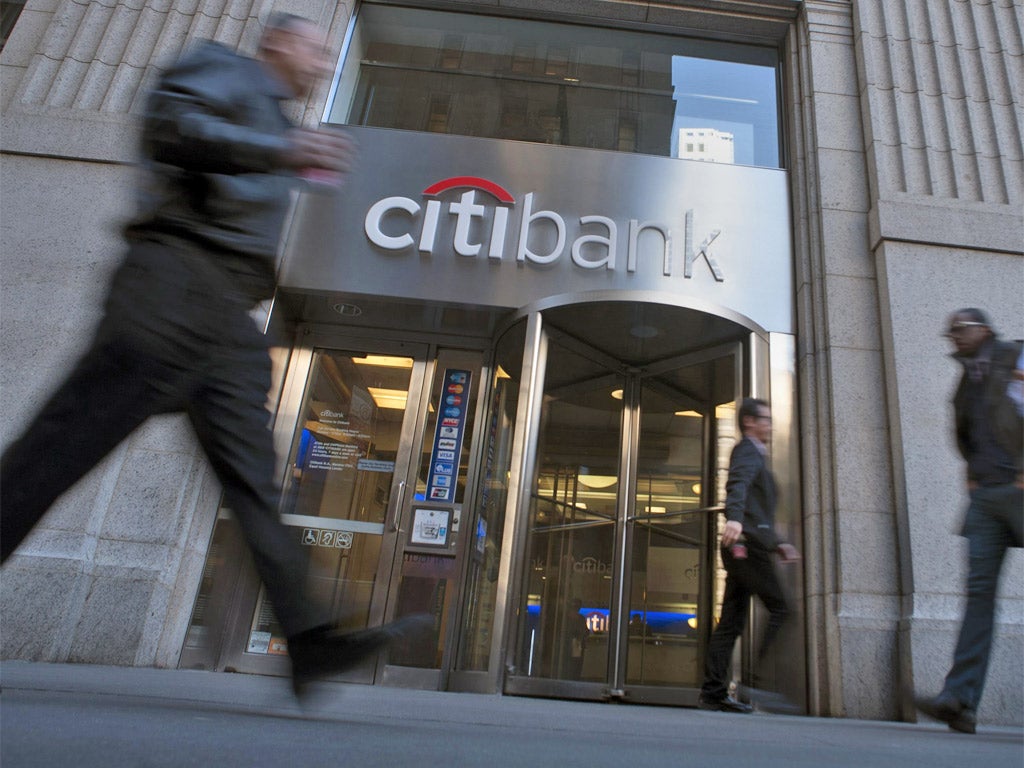The incredible shrinking bank
Vikram Pandit's abrupt departure as chief executive of Citigroup has revived questions about the bank's direction

On Monday, Citigroup appeared to be heading in the right direction. Although its third-quarter numbers had been dulled by a $4.7bn (£2.9bn) writedown related to its stake in the Morgan Stanley Smith Barney brokerage business, the underlying figures were positive. Profits from commercial and investment banking were up and funding costs were lower. Meanwhile, the North American retail business had grown, as mortgage revenues rose on the back of wider margins.
The results boosted the company's capital buffers. The once-struggling giant, founded 200 years ago last summer as the City Bank of New York, now commanded a reading of 8.6 per cent on Basel III equity ration, ahead of its goal of 8 per cent for the year end.
And yet, all was not well. Behind the scenes, the man who had steered Citi through the financial crisis was on his way out. Vikram Pandit's abrupt departure would soon revive questions about where the bank was headed, as the spotlight turned on the new boss, Michael Corbat, a Citigroup veteran.
He takes over a very different beast from the one encountered by Mr Pandit when he assumed the helm in late 2007. Back then, the storied institution was already hurtling down the potholed road that, with hindsight, would force it to crash land, in 2008, at the door of the American taxpayer. Even as Mr Pandit settled into the chief executive's suite, losses were mounting as the ticking time bomb of subprime mortgages went off.
He could hardly have guessed at what would follow. But this week, after toiling through the credit crunch, securing a bailout and, eventually, leaving the US Treasury with a profit on its investment, the former hedge fund manager posted results that spoke of a smaller – the staff count was down from around 375,000 when he took over to around 260,000 – but steadier bank.
News of his resignation the day after was soon followed by reports of tensions in the boardroom caused by some high-profile mis-steps in the preceding months, including the Smith Barney writedown, a shareholder vote against Mr Pandit's $14.9m 2011 pay package, and Citi's failure to win regulatory backing for its capital plans after a stress test. "It seems clear that though the announcement seems abrupt, that the decision was not made hastily," Glenn Schorr, an analyst at Nomura in New York, said.
According to accounts that have emerged since, tensions between Mr Pandit and the board, particularly the chairman, Michael O'Neill, over strategy and performance spilled out into the open during a meeting on Monday, eventually prompting the India-born chief executive to tender his resignation. For his part, Mr O'Neill, speaking during an analyst call in the wake of the departure, offered little detail, saying simply that Mr Pandit had resigned and the board had accepted his resignation.
In contrast to Mr Pandit, a former hedge fund manager who often faced questions about his ability to run a large banking conglomerate, the new boss certainly knows his way around the business.
He is the quintessential company man, having worked in everything from Citi's wealth management unit to its Holdings arm, the so-called bad bank stuffed full of investments that Citi wanted to get rid of. Most recently, he headed Citi's Europe, Middle East and Africa business.
On the Tuesday afternoon conference call, the new chief executive signalled a greater focus on bringing costs under control. What shape this will take remains unclear, as Mr Corbat, unsurprisingly perhaps given the timing of his appointment, offered little in the way of details.
As the market works out where Mr Corbat plans to take the bank, the spotlight is also turning to Mr O'Neill, who is better known to those on the outside. In particular, attention in some quarters is turning to his record as a tough but successful taskmaster while at the Bank of Hawaii, where he imposed cuts to boost profits even as revenues fell, in turn driving up the shares.
The share price, in fact, remains a key challenge at Citi after falling by nearly 90 per cent during Mr Pandit's tenure. For now, investors seem to be betting that Mr Corbat will be able to engineer a turnaround, with the stock gaining ground since the announcement of his appointment.
Analysts, too, seem hopeful. Nomura's Mr Schorr said that while "things at Citi were trending in the right direction", "given a few wishes, we would have asked for more focus" on expenses and "a better relationship with the regulators".
Follow the money: Ups and downs
1998 Citicorp and Travelers complete $70bn (£43bn) merger to create the world's biggest bank, Citigroup
April 2007 Mr Pandit joins when Citigroup buys his hedge fund
Dec 2007 Mr Pandit becomes chief executive officer
October 2008 $25bn capital injection from US government's Tarp
Nov 2008 Gets government guarantee on $306bn loans and $20bn cash as stock dives
Dec 2010 US sells last of its shares in Citigroup, at a profit for taxpayers
March 2012 Fails stress tests and is barred from returning capital
April 2012 Shareholders oppose Mr Pandit's pay package
Sept 2012 Books near $3bn loss in sale of stake in retail brokerage
Subscribe to Independent Premium to bookmark this article
Want to bookmark your favourite articles and stories to read or reference later? Start your Independent Premium subscription today.

Join our commenting forum
Join thought-provoking conversations, follow other Independent readers and see their replies